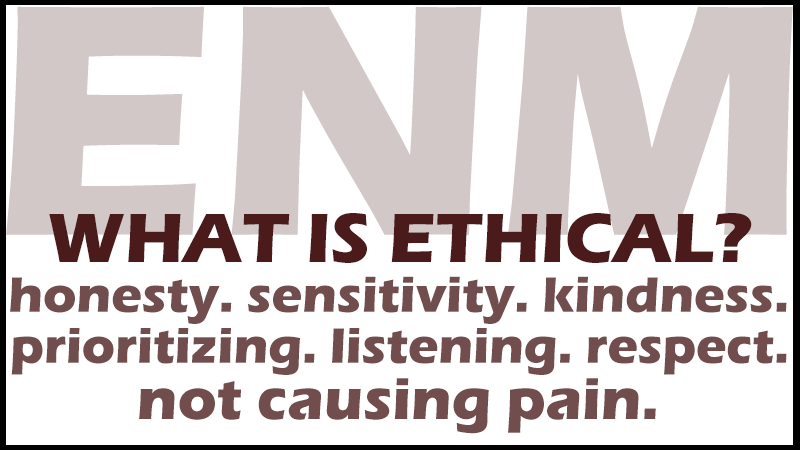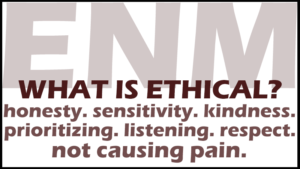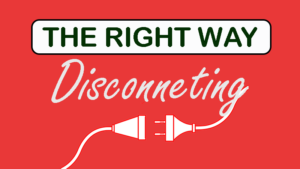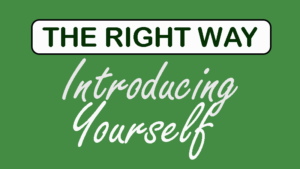In our fluid world of relationships, ethical non-monogamy (ENM) has taken on many shades of meaning. While I have known many couples who practice it, in past decades I have encountered them more often in their more senior years, in the later years of their marriages.
Recently, I have spoken with people of all ages who really enjoy it, and others who find it very difficult to practice without getting their feelings hurt over and over.
It has made me wonder how the ‘ethical’ part is defined by participants and which forms of it are fulfilling and provide completion to a person’s life; vs forms that bring pain, doubt, and feed insecurities.
Here are some examples:
Paulette is single, does not want a commitment, but enjoys intimacy on her own terms. She dates on apps, selects partners who are also not looking for a monogamous relationship, but she chooses to not share their names or information with her other partners. She is clear that she is seeing others, but they do not meet each other, she is careful to find partners who don’t travel in the same circles, do not have the same types of careers, and are geographically distant. As a result, she reports that she finds very little friction, and avoids complications like the following:
-No cross-dating of exes or existing friends
-No group multi-partner encounters in which they meet each other
-Each person brings enjoys a singular attachment to her while bearing no responsibility for a full-time relationship
-No hurt feelings ‘envisioning her’ with another person to whom they can assign a face or image in their minds, so they never compare themselves to another of her ‘friends’, and avoid wondering why she picked one over the other to go to a concert or other event
This is a classic case of ‘don’t cross the streams’, and things work really well for her. More importantly, she believes she is being Ethical (E) because she is careful of each partner’s feelings, making sure they do not feel like one-of-many, and in no way diminishing their importance to her. This brings completion to her life, because she doesn’t have a single person telling her what to do, monopolizing her time, or imposing their needs on her beyond that particular time they spend together, no matter how frequently. Her partners never feel that she has chosen another over them, because as an example: Tuesday always belongs to the same man. So, she is simply unavailable on Tuesdays to her other partners. Each person has a specific day of the week that has worked for both of them since the beginning, and they stick with that, in order to minimize expectations of anything more.
Additionally, she never shares a photo or stories about those other partners with the one she is currently enjoying time with. It would run the risk of creating jealousy or hurt feelings, because we are after all, all human beings, with real feelings, and we can’t help but compare ourselves to others we see.
Martina is a younger woman who is single and practices ENM within her circle of friends. They all know each other. Many have dated each other over the last decade, and are now together in cross-over relationships.
Martina is clear with her current partner with her boundaries, and he is respectful of those wishes. Unfortunately, her ex is involved with her current partner as well, and shows no concern for her boundaries. This has the result of hurt feelings, which feels opposite to the goal of ENM. They have found that if one is selected over the other for attending an event, the other suffers hurt feelings and much drama has historically ensued. This feels like a form of the cults from the hippie-love days. This free-flow communal type of love dynamic takes very strong, emotionally mature, confident individuals to build. If just one person in the complex relationship is unable to retain their poise, kindness towards all in the relationships, and their ability to truly share, then it can push a stick into the spokes of a otherwise smoothly turning wheel.
Furthermore, if things end badly, how does that affect the intimate circle of friends? Can one partner still stay friends with that person who is no longer connected to the circle? If one of the partners is uncomfortable with another new partner who has joined their dynamic, how does Ethical (E) stand up to this challenge? Does a partner ignore a desired connection because his existing partner doesn’t like them? Ethical (E) seems to skate on thin ice in this type of dynamic.
Jake and his wife of 20 years love each other but no longer have a fire for just each other. Over the years, each has developed desires that the other does not wish to, or cannot, fulfill. They both want to be happy, and they love the life they have together. They have forged a set of rules in order to allow each other to go out, discreetly, with others, and have those needs met. They don’t talk about it with each other, except to make sure that each is still emotionally ok with their decisions. They always make time for each other, and they still have affection and connection with each other. In fact, it is stronger, because each is not disappointed that the other can’t fulfill their needs, and because they know how much they mean to each other on so many other levels. Each is grateful that the other is satisfied regularly, and neither feels that the outside relationships are impinging on their home life, commitment to each other, or to what they have built together. The Ethical (E) nature of their arrangement is strong, in that they are highly attuned to each other’s needs, there is no jealousy, and there is a bond of love that causes them to treat each other with respect and dignity.
Robin is ENM, because his wife no longer has a desire for sex. He is clear, honest and transparent with her about what he does, and believes he is being Ethical (E) because he is up front about it all. He does, however, know deep down that his wife does not want this. He sees her hurt when he leaves to go out, and feels her pain when he returns, although these feelings remain unspoken. She seems to feel it is her fault and wants to save her marriage to a man she loves, and he wants to save his marriage to a woman he loves and the life they have built, without sacrificing the years of sexual appetite he has left. So he continues to go, and continues to believe it is Ethical (E) because he is completely honest and transparent about it. But is that ethical? Again, isn’t the purpose of ENM actually to prevent hurt to your partner’s feelings, to the value both place on the relationship, and how they feel loved?
As you may have experienced, or can imagine, navigating ENM means really paying attention to the ETHICAL part. It is not a ‘get out of jail free card’ where you can just flash it like an adult hall-pass and go running around satisfying your impulsive desires for self-satisfaction, while your partner or partners lose parts of themselves to pain, self-doubt, insecurity, or outright loss of dignity.
The Ethical (E) part of ENM means caring what your partners want and need, and making sure you are the good steward of the experience that the two (or three or more) of you will have.







